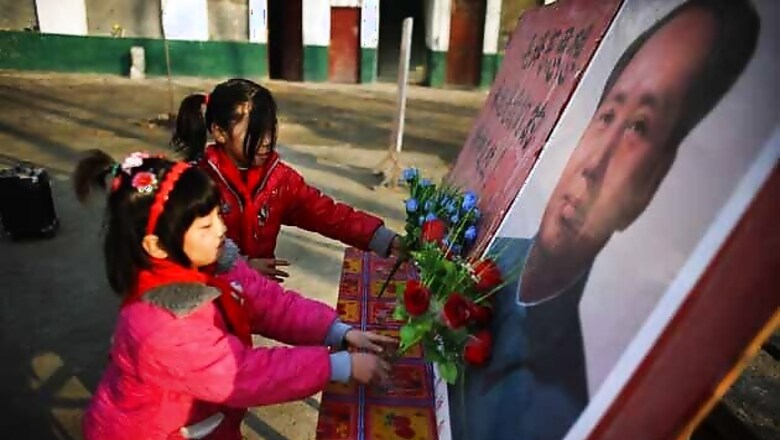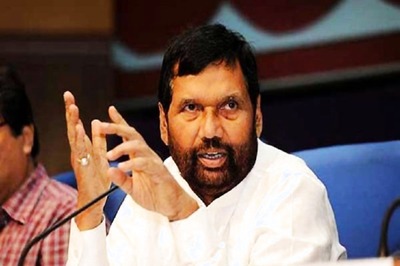
views
China celebrated the 120th birthday of Mao Zedong, the founder of modern China, on Thursday, but with scaled-back festivities as President Xi Jinping embarks on broad economic reforms which have unsettled leftists.
Mao has become a potent symbol for leftists within the ruling Communist Party who feel that three decades of market-based reform have gone too far, creating social inequalities like a yawning rich-poor gap and pervasive corruption.
In venerating Mao, they sometimes seek to put pressure on the current leadership and its market-oriented policies while managing to avoid expressing open dissent.
While all seven members of the party's elite inner core, the Politburo Standing Committee, visited Mao's mausoleum on Tiananmen Square, other activities nationwide were toned down.
The state-run Xinhua news agency said on its Weibo microblog that the leaders, including Xi, bowed three times in front of a statue of Mao and payed their respects to his embalmed body, "recalling Comrade Mao Zedong's great achievements".
The party's official People's Daily newspaper pushed to its inside pages stories about Mao's birthday, although it did carry a commentary praising him as a "great patriot and hero".
A source with ties to the leadership said there would still be a high level of activity to mark the occasion but the number of events would be scaled back.
"The attendance of Standing Committee members is to placate leftists after reforms at the third plenum," said the source, who spoke on condition of anonymity to avoid repercussions for talking to a foreign reporter without permission.
China last month unwrapped its boldest set of economic and social reforms in nearly three decades, relaxing its one-child policy and further freeing up markets in order to put the world's second-largest economy on a more stable footing.
Still, Xi and his team gave themselves until 2020 to achieve "decisive" results - a tacit acknowledgement of the difficulty of the task when the state-run sector championed during Mao's heyday remains strong and when many are unhappy with growing social problems brought by the party's economic reforms.
"The celebrations have to be grand or people will not be happy," said another source, who has ties to the party's traditional leftists.
Mao, who died in 1976, remains a divisive figure.
His image adorns banknotes and his embalmed body attracts hundreds, if not thousands, of visitors a day to Beijing.
While the party has acknowledged he made mistakes, there has yet to be an official accounting for the chaos of the 1966-76 Cultural Revolution or the millions of deaths from starvation during the 1958-61 Great Leap Forward.
NO SIDE SATISFIED?
Xi suffered personally during the Cultural Revolution when his father was jailed. Xi was sent to the countryside to live with peasants, like millions of other young urban Chinese.
While visiting Hunan, the southern province where Mao was born, in early November, Xi said the celebrations for the anniversary should be "solemn, simple and pragmatic", according to state media.
That did not stop Xi from lauding Maoism in several speeches this year, as he sought to appeal to leftists in the wake of a scandal involving Bo Xilai, a former contender for top leadership who pushed an egalitarian, quasi-Maoist agenda until he was felled and jailed for corruption.
"In the end, probably no side will be very satisfied," said Zhang Lifan, a Beijing-based political commentator and historian, referring to how China will mark the birthday.
"The reformers don't think Mao should be commemorated, because he committed crimes, but his supporters think the commemorations aren't enough."
Chinese newspapers have reported that several events originally planned for Thursday have been adjusted or changed completely, including a concert that was supposed to celebrate Mao but which has been relabelled a new year gala.
"The authorities don't want the commemorations for Mao to be high-profile," influential tabloid the Global Times, published by the party's official People's Daily, quoted Wang Zhanyang, director of the Political Science Department at the Central Institute of Socialism, as saying.
"Some regional conservative people and officials with vested interests want to restrain reform by falsely promoting some of Mao's most conservative thoughts, which is not what the party follows," Wang added.
Still, the message appears not to have totally seeped through to Hunan, where many still venerate Mao as a demigod.
The town of Shaoshan, where Mao was born on December 26, 1893, has spent about 2 billion yuan on 12 projects for the anniversary celebration, the official Xiangtan Daily reported.




















Comments
0 comment